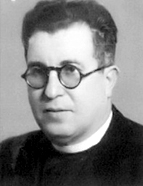

Overseas, he was appointed, in 1957, Visiting Luís de Camões of Portuguese Studies Professor at the Ernest Oppenheimer Institute of Portuguese Studies at the University of the Witwatersrand (Johannesburg). However, his stay in the Portuguese capital was short-lived. He complemented his teaching activities with numerous trips to Europe, Africa, and Asia, where he combined his research with the missionary spirit he never abandoned. Additionally, his "love" for Macau compelled him to return each year to the place where he had completed his studies (J. Mendes de Almeida, ibidem, p. 18). Adriano Moreira recalled that in 1959 alone, Silva Rego travelled through Nigeria, Cameroon, French Equatorial Africa, Angola, the Belgian Congo, Uganda, Kenya, Tanganyika, Rhodesia, and South Africa (A. Moreira, "O Padroado..." [The Patronage...], 1991, p. 232). Fluent in English and French, he gave lectures during many of his travels, particularly in Cambridge, Colombo, Johannesburg, Luanda, Lourenço Marques, Goa, Singapore, and Stockholm, many of which led to publications. Over time, in addition to gaining national recognition, he attained a significant level of international prominence, frequently participating in major scientific events both as an organiser and as a speaker. His CV includes, for instance, participation in the 1st International Seminar on Indo-Portuguese History, organising the 2nd Seminar years later in Lisbon (1980), representing Portugal on the International Commission on Maritime History (1960), attending the Luso-Spanish Congresses for the Progress of Sciences (in Coimbra in 1956 and Porto in 1962), the Tenth and Eleventh International Congresses of Historical Sciences (Rome, 1955/Stockholm, 1960), the First National Conference of Southeast Asian Historians (Singapore, 1961), and presiding over the Second Congress of the International Indian Ocean Historical Association (Lourenço Marques, 1962), among others. (F. Castelo Branco, "Correspondência..." [Correspondence...], 1991, p. 89; R. Gulbenkian, ibidem , p. 162).
António da Silva Rego's mission to the Goa Historical Archives in 1951 resulted in a series of microfilms of documents pertaining to the missionary work of the Portuguese in the Orient. The necessity for preservation and dissemination of these materials led to the establishment of the Filmoteca Ultramarina Portuguesa [Portuguese Overseas Film Library] in 1952 (E. Trigo de Sousa et al, ibidem, p. 248). This endeavour was inspired by the extensive discussions he had years earlier with his colleague at the Colonial College and future Minister for Overseas Territories, General Sarmento Rodrigues, who supported Rego's missions to Goa and encouraged his ambition to preserve that and other documentary collections related to the history of missionary work and Portuguese patronage dispersed in this and other foreign archives (R. Gulbenkian, ibidem , p. 156). Three years later, the Film Library was incorporated into the Centro de Estudos Históricos Ultramarinos [Centre for Overseas Historical Studies], which was also established in 1955 by António da Silva Rego. This project was a response to his aspiration to assign critical editions of overseas classics to distinguished specialists and to establish an international journal. Indeed, Silva Rego's name was indelibly linked to the establishment of periodicals and bulletins at the institutions he founded or with which he collaborated. The Boletim da Filmoteca Ultramarina Portuguesa [Bulletin of the Portuguese Overseas Film Library] (1954) or the Studia (1958), the journal of the Centro de Estudos Históricos e Ultramarinos stand out. Inaugurated with a text of his own titled "Do tempo, do homem e da história" [Of time, man and history], he oversaw the publication of thirty-nine volumes, compiling works by numerous Portuguese and foreign historians. Volume 53 (1994) was dedicated to him posthumously, which provides us with insights not only into the historian but also into the shared qualities that defined the man who was Silva Rego. He also contributed to and supported other periodicals such as the Journals Estudos Ultramarinos, Comunidades Portuguesas, Ultramar, Portugal em África, Lusitania Sacra, the Boletim da Sociedade de Geografia, Boletim Geral das Colónias, Boletim Geral do Ultramar and the Anais da Academia Portuguesa da História.
This work is financed by national funds through FCT - Foundation for Science and Technology, I.P, in the scope of the projects UIDB/04311/2020 and UIDP/04311/2020.
